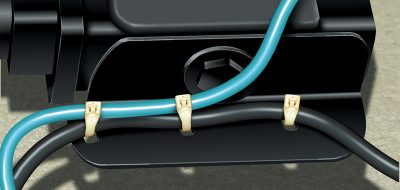By Bob Difley
 Japanese car company Nissan seems to be leading the pack of car companies to market with their 4-door hatchback Leaf electric vehicle (EV). Not only will Nissan be one of the first to introduce an all electric car to the American market, which will hit dealer showrooms by the end of this year, but last week they stunned the electric vehicle market with the announcement that they will also be installing inexpensive fast charge stations–which they are now installing in Japan–as soon as they get UL approval.
Japanese car company Nissan seems to be leading the pack of car companies to market with their 4-door hatchback Leaf electric vehicle (EV). Not only will Nissan be one of the first to introduce an all electric car to the American market, which will hit dealer showrooms by the end of this year, but last week they stunned the electric vehicle market with the announcement that they will also be installing inexpensive fast charge stations–which they are now installing in Japan–as soon as they get UL approval.
Fast chargers, installed at charging stations–the electric vehicle’s equivalent to a gas station–will charge an electric vehicle battery pack to 80% capacity in about 30 minutes. When first designed, these chargers were estimated to cost from $60 – 100,000, but Nissan’s breakthrough charger will cost just $17,000. At such a price charging stations could become common at restaurants, rest stops, parking lots, tourist attractions, shopping malls, campgrounds, and even gas stations, making re-filling your EV toad’s batteries as easy as filling with petrol and reducing driver anxiety over the Leaf’s shorter 100 mile range compared to a car using a gasoline or diesel engine.
The regenerative braking system, which recharges the battery pack while braking, helps the Leaf to the 100 mile range figure, though on the highway, with little braking compared to city driving, the range could drop to half that. Fast charging the battery pack two or three times a day could also degrade the battery reducing it’s life by 10% Nissan officials state. The cost to power up the discharged batteries will cost about $3 at home or at power stations.
Could this speed the possibility of using pollution free EVs like the Leaf as toads for RVers? Maybe sooner than previously predicted, especially if federal and state incentives to buy fuel efficient vehicles are in effect, as they are now, which bring the EVs closer in price to comparable gasoline vehicles. And with eliminating the need for gasoline and with the lower maintenance of electric motors compared to gasoline or diesel engines, the Leaf might kick-start broader interest in EVs.
Bob Difley’s eBooks:
111Ways to get the Biggest Bang for Your RV Lifestyle Buck
BOONDOCKING: Finding the Perfect Campsite on America’s Public Lands






Pingback: Jasa SEO Jakarta Profesional
Pingback: the glades condo
Pingback: push present
Pingback: f-650 f-750
Pingback: how to rap
Pingback: www
Pingback: www
Carson
I read with interest on electric cars etc. whether it is Nissan, whatever, and for the life of me understand if people are out of work depending on unemployment to just live from week to week how in the world are they going to be purchasing these electric cars at the price they cost. In my family WE both work and there is no way we can afford one with both of us working FULL time. So point here is …Where is the money coming from and live with inflation going sky high? How are the people that are on fixed incomes and Government assistance afford one? Look at your statistics not very many people are buying these cars and it doesn’t look like in the near future they will purchase them at this high price. We need to be realistic here Bob.
Ardis
“The regenerative braking system, which recharges the battery pack while braking, helps the Leaf to the 100 mile range figure, though on the highway, with little braking compared to city driving, the range could drop to half that.”
As an engineer, I don’t understand that statement. The regenerative braking is probably only 30% efficient. No matter how efficient the regen is, you will have a net loss of energy (See the Second Law of Thermodynamics) during an acceleration/braking cycle. I think the better mileage in city driving would come from lower speeds and less energy lost to air friction than on the highway. There is no way possible to not lose a lot of energy when you start and stop.
Ron Butler
Joe,
I am the first to admit that I don’t understand electricity!! If the light or whatever doesn’t turn on, I’m lost! My eyes glaze over when they start talking amps, volts etc. However, did innovators ever fully understand the implications and problems of the technology that they were first working on? Did that stop them? Did Edison give up after he failed several times? How many times did he fail before he got it right? Did that seem like an unsurmountable problem so therefore, you no longer keep working, investigating and innovating? Granted, right now the problems appear to be unsurmountable. What about 5 – 10 years down the road? Even if they are, we still have another choice for a commuter car for those people who just need something around town.
It also appears to me that not every car out there is towable, but has that stopped people from buying them? We just select what is best for our needs and uses but that doesn’t make it right or wrong, just best for us. Hate to see us give up the innovation that we have been known for in the past, but unfortunately, many in our society are willing to let that happen.
Keep camping!
Joe
Ron – I can understand you point about this generation of electric cars being very early in the process. Still, it’s easy to make the assumption that a technology can be easily improved when some of the technical details are not well understood.
For example by crude analogy. Imagine someone who doesn’t know much about RV’s and they pull into the campground and see a 15amp outlet. They see a plug that looks like the one at home, and they find a combination of cables and adapters that will fit in that outlet. Great they say, and plug in their RV. The walk back inside, turn on a few light and think ‘great, this campground electricity stuff is amazing. Now I can turn on whatever I want.’
An experienced RVer can tell you exactly what will happen when this well intentioned by naive camper turns on the A/C, coffee pot and hairdryer. Yet, the new RVer doesn’t understand. Lights run on electricity, they work. A/C runs on electricity, it should work too. Makes sense if you don’t know much about the technology, but it doesn’t make any sense at all if you do understand how things work.
The faith in what electric cars will someday be is similar. It’s easy to say ‘We have a car that will go 100 miles on a charge, with the smart design and some technological improvements, it should be no problem to get to 200, or 300, or even 400 miles.
The problem is that people who make that leap don’t understand how much energy batteries carry for their size and weight. Even with tremendous battery improvements, it will be tough to carry large loads or travel longer distances with the energy that can be stored in batteries.
Hope that makes sense. Battery powered vehicles are fantastic for what they are, and they will get better. Still, we should be careful about extrapolating without understanding more about how the technology works.
Hannco
Bob, the Chevrolet Volt will be the 1st electric car in our market and will be released later this year.
http://consumerguideauto.howstuffworks.com/2011-chevrolet-volt.htm
Ron Butler
Hmm, am I missing the point here somewhere? Does Bob suggest that this will be the first, only and last vehicle developed with battery power? Does he say that it is your only choice from now on?
Let’s see, how far did internal combustion autos travel when first developed? How many gas stations were already in place? Did everyone immediatly sell/trade off their favorite horse and buggy for the new auto? Can we still repair/fix/get running again our internal combustion engines with a screw driver, pliers and bailing wire, or do we need a computer degree and read-out to see what is wrong with it?
Where would our technology be with this kind of doubt and questioning? Well, maybe our lives would be simpler!!
Isn’t this just another first step of many? If you don’t feel comfortable using this one for your toad, keep what you have. Maybe several more years down the line, the technology will better suit your needs to reconsider it. Does this sound reasonable, or am I really missing something here?!?
TallGuy
Dana, old chap. I don’t see what your logical points are in this discussion. The issue with an EV is NOT how to charge it while dragging it behind us or relying on unpredictable camping outlets. But ‘rawther’ the logical dilemna is more akin to how to keep it charged during the successful completion of an independent voyage in excess of 150-200 miles to make it more competitive with a gasoline engine.
It really doesn’t matter if the ‘logic’ includes ‘station motors’ that eliminate ‘parasitic drag of the drive train’, does it? Nor does regenerative braking help at all on level or uphill tours, does it? How would you measure a positive battery charge while you ascend a long mountain pass, my friend if your regenerative braking is non-existent? Or a long run along an absolutely level desert ?
Logically speaking, we routinely do exploration side trips in our dinghy in excess of a 120 mileage range, round trip, and we’d “rawther” be confident, you see, that we’d get back to our starting point without a big ole worry that the ‘can’ would be empty, wouldn’t we?
THAT’s the point-of-logic issue, old man. Cheers!
Joe
Dana’s idea of a toad that charges while being dragged is a good one, but the rest of the story (as Dana points out) is that the charge you gain from dragging is still being generated by gas or diesel.
RV campground electric tends to be a bit on the shoddy side anyway. How many breakers trip when too many campers turn on the A/C, and how many of us use some sort of surge guard b/c we don’t trust the campground electric? Adding charging cars to the mix would either require tremendous upgrades or be a complete disaster.
Dana
An electric car COULD be the IDEAL dinghy. Whether the upcoming models will be, is another question.
An ‘ideal’ electric car for RV towing would include:
Two to four wheel station electric motors rather than the ‘motor stuck in place of a gasoline engine’ that all the current designs seem to have in their “design”. This is very inefficient! Wheel station motors eliminate all the parasitic drag of a drive train.
Regenerative braking could help recharge the battery while driving but with a modified charge program could also charge the battery while being towed. It would be a low-level (low drag) charge rate that would fill the “can” during a normal day’s driving of the RV. Plug-in charging would take care of the battery while based at a campground/RV park. This will decrease the milage of the RV during the tow but that will be an acceptable trade-off for the full charge. You are going to pay to charge the car one way or another.
Just trying to throw some logic into the equation.
Joe
Isn’t using an electric toad with an RV sort of like ordering diet coke with a 3000 calorie fast food meal?
100 miles between charges isn’t going to cut it anywhere except in urban areas.
Just curious, how many of the current alternative fuel cars are towable 4-down (either all electric like the leaf, hybrid like a prius, or LPG like some of the small Honda’s)? I think the answer is 0, but I’d like to know for sure.
TallGuy
I just don’t see it… an EV… as any kind of desirable Toad for those RVrs who go exploring to places like Arches NP, U.P. Michigan, Nova Scotia, Mexican Hat, UT, Blue Ridge Pkwy, Kitt Peak, AZ, the beaches of Mustang Island, TX, the Talimena Scenic Drive, AR, Mexican Hat, UT, or even the PCH in Mexifornia. Just curious; what do you think an EV is good for in the RV lifestyle? In other words, just how would you use it?
I’m betting that not many of us codgers would trust we could get a quick ‘plug-in’ from a passing good Samaritan on a desert highway or up a mountain pass or deep in the woods to get us to the next town if we ran out of mojo, like we can with a gas engine. Hybrid maybe, but not just a DC alone.
Now, if you’re talking about RVrs who park in close to town for long periods of ‘Sitting’, and just need something to go to the Harris-Teeter once in a while, that’s a whole different discussion.
Tom Hargreaves
I wonder if the Leaf, or the hybrids, can be towed? Seems as though it would make a decent knock-around vehicle, unless the RVer is intent on exploring hundreds of miles around. I bet that once the Leaf, the Volt, the Tesla and others get going we’ll see more rapid advances in batteries and faster concept-to-market for the advances already made and awaiting development.
Tom
Pingback: ContentCentral.com » Nissan Leaf leads the pack in electric vehicles